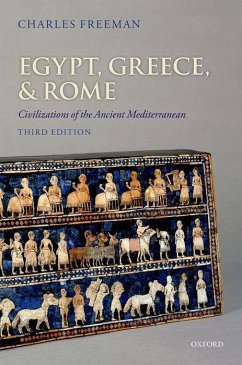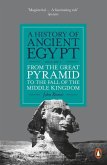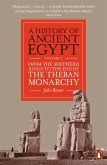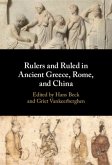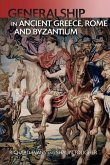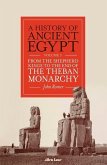Charles Freeman (Freelance academic)
Egypt, Greece, and Rome
Civilizations of the Ancient Mediterranean
Charles Freeman (Freelance academic)
Egypt, Greece, and Rome
Civilizations of the Ancient Mediterranean
- Broschiertes Buch
- Merkliste
- Auf die Merkliste
- Bewerten Bewerten
- Teilen
- Produkt teilen
- Produkterinnerung
- Produkterinnerung
Regarded as one of the best general histories of the ancient world, it is written for the general reader and the student coming to the subject for the first time and provides a reliable and highly accessible point of entry to the period. The 3rd edition has been extensively revised with several chapters rewritten and a wealth of new material added.
Andere Kunden interessierten sich auch für
![Egypt, Greece, and Rome Egypt, Greece, and Rome]() Corinna Rossi (Italy. Politecnico di Milano)Egypt, Greece, and Rome33,99 €
Corinna Rossi (Italy. Politecnico di Milano)Egypt, Greece, and Rome33,99 €![A History of Ancient Egypt, Volume 2 A History of Ancient Egypt, Volume 2]() John RomerA History of Ancient Egypt, Volume 226,99 €
John RomerA History of Ancient Egypt, Volume 226,99 €![A History of Ancient Egypt, Volume 3 A History of Ancient Egypt, Volume 3]() John RomerA History of Ancient Egypt, Volume 321,99 €
John RomerA History of Ancient Egypt, Volume 321,99 €![Trade centers and Trade routes in Upper Egypt, during the Old and Middle Kingdoms Trade centers and Trade routes in Upper Egypt, during the Old and Middle Kingdoms]() Mohamed Osman AbdollahTrade centers and Trade routes in Upper Egypt, during the Old and Middle Kingdoms102,99 €
Mohamed Osman AbdollahTrade centers and Trade routes in Upper Egypt, during the Old and Middle Kingdoms102,99 €![Rulers and Ruled in Ancient Greece, Rome, and China Rulers and Ruled in Ancient Greece, Rome, and China]() Rulers and Ruled in Ancient Greece, Rome, and China168,99 €
Rulers and Ruled in Ancient Greece, Rome, and China168,99 €![Generalship in Ancient Greece, Rome and Byzantium Generalship in Ancient Greece, Rome and Byzantium]() Generalship in Ancient Greece, Rome and Byzantium29,99 €
Generalship in Ancient Greece, Rome and Byzantium29,99 €![A History of Ancient Egypt, Volume 3 A History of Ancient Egypt, Volume 3]() John RomerA History of Ancient Egypt, Volume 353,99 €
John RomerA History of Ancient Egypt, Volume 353,99 €-
-
-
Regarded as one of the best general histories of the ancient world, it is written for the general reader and the student coming to the subject for the first time and provides a reliable and highly accessible point of entry to the period. The 3rd edition has been extensively revised with several chapters rewritten and a wealth of new material added.
Hinweis: Dieser Artikel kann nur an eine deutsche Lieferadresse ausgeliefert werden.
Hinweis: Dieser Artikel kann nur an eine deutsche Lieferadresse ausgeliefert werden.
Produktdetails
- Produktdetails
- Verlag: Oxford University Press
- 3 Revised edition
- Seitenzahl: 824
- Erscheinungstermin: 27. Mai 2014
- Englisch
- Abmessung: 232mm x 159mm x 45mm
- Gewicht: 1372g
- ISBN-13: 9780199651924
- ISBN-10: 0199651922
- Artikelnr.: 40308314
- Herstellerkennzeichnung
- Libri GmbH
- Europaallee 1
- 36244 Bad Hersfeld
- gpsr@libri.de
- Verlag: Oxford University Press
- 3 Revised edition
- Seitenzahl: 824
- Erscheinungstermin: 27. Mai 2014
- Englisch
- Abmessung: 232mm x 159mm x 45mm
- Gewicht: 1372g
- ISBN-13: 9780199651924
- ISBN-10: 0199651922
- Artikelnr.: 40308314
- Herstellerkennzeichnung
- Libri GmbH
- Europaallee 1
- 36244 Bad Hersfeld
- gpsr@libri.de
Charles Freeman is a freelance academic historian who worked on his first archaeological dig, a first century AD Roman villa, in Italy as far back as 1966. Following many years of wandering in the Mediterranean, he has been leading study tours of Italy, Greece and Turkey for the past ten years. In 2005, Charles was appointed as Historical Consultant to the prestigious Blue Guides and has written introductions and sections of several of the most recent editions. He is also author of Sites of Antiquity: Fifty Sites that Explain the Classical World (2009), a full illustrated survey that might be seen as a companion to Egypt, Greece and Rome.
* Dedication
* Foreword to the Third edition
* Author's Preface
* Acknowledgements
* List of Plates
* List of Maps
* List of Figures
* 1: Approaching the Ancient World
* 2: The Birth of Civilization: The Ancient Near East, 5000- 1200 BC
* 3: Pyramids and Power, the Creation of an Egyptian State, 3500-1985
BC
* 4: Stability and Expansion, Egypt in the Middle and New Kingdoms,
1985- 1000 BC
* Interlude 1: The Amarna Letters
* 5: Living in New Kingdom Egypt
* 6: The Ancient Near East, 1200- 500 BC
* 7: 'The Sea between the Lands', the Mediterranean as the Cradle of
the Classical World
* 8: Civilizations of the Bronze Age Aegean, 2000 -1100 BC
* 9: The Birth of a New Greece 1100 - 700 BC
* 10: 'Travelling Heroes', The Greeks in a Wider World, 800-600 BC
* Interlude 2: Sappho and Lyric Poetry
* 11: Hoplites and Tyrants: The Emergence of the City State
* 12: Craftsmanship and Creativity in Archaic Greece
* 13: The Persian Wars
* 14: The Greek Way of Life
* 15: Experiencing the Supernatural: the Spiritual World of the Greeks
* Interlude 3: 'After this all becomes possible.' Creating Classical
Art, 500 - 460 BC
* 16: Democracy and Empire, Athens in the Fifth Century
* 17: Rethinking the World: From Aeschylus to Aristotle
* Interlude 4: Rhetoric
* 18: The Struggle for Power, 431- 338 BC
* 19: Alexander the Great and the Transformation of the Greek World
* 20: Tensions and Creativity: The Hellenistic World, 323 -30 BC
* Interlude 5: Celts and Parthians
* 21: The Etruscans and Early Rome
* 22: Rome Becomes a Mediterranean Power
* 23: Rome, A Republic Under Stress
* Interlude 6: Voices from the Republic
* 24: The Failure of Republican Politics
* Interlude 7: Women in the Roman Republic
* 25: Augustus and the Founding of Empire
* 26: Consolidating the Roman Empire, AD 14-161
* Interlude 8: The Sebasteion at Aphrodisias
* 27: Running and Defending an Empire
* 28: Social and Economic Life in the Empire
* Interlude 9: The Romans as Builders
* 29: The Flourishing of Greek Culture
* 30: An Empire in Crisis, AD 161-313
* 31: The Early Christian Communities, AD 33-313
* 32: Constantine and His Successors
* 33: The Christian Emperor
* 34: The Collapse of the Classical West, 395-600
* 35: The Emergence of the Byzantine Empire
* 36: Legacies
* What to Read Next
* Date Chart
* List of Events
* Index
* Foreword to the Third edition
* Author's Preface
* Acknowledgements
* List of Plates
* List of Maps
* List of Figures
* 1: Approaching the Ancient World
* 2: The Birth of Civilization: The Ancient Near East, 5000- 1200 BC
* 3: Pyramids and Power, the Creation of an Egyptian State, 3500-1985
BC
* 4: Stability and Expansion, Egypt in the Middle and New Kingdoms,
1985- 1000 BC
* Interlude 1: The Amarna Letters
* 5: Living in New Kingdom Egypt
* 6: The Ancient Near East, 1200- 500 BC
* 7: 'The Sea between the Lands', the Mediterranean as the Cradle of
the Classical World
* 8: Civilizations of the Bronze Age Aegean, 2000 -1100 BC
* 9: The Birth of a New Greece 1100 - 700 BC
* 10: 'Travelling Heroes', The Greeks in a Wider World, 800-600 BC
* Interlude 2: Sappho and Lyric Poetry
* 11: Hoplites and Tyrants: The Emergence of the City State
* 12: Craftsmanship and Creativity in Archaic Greece
* 13: The Persian Wars
* 14: The Greek Way of Life
* 15: Experiencing the Supernatural: the Spiritual World of the Greeks
* Interlude 3: 'After this all becomes possible.' Creating Classical
Art, 500 - 460 BC
* 16: Democracy and Empire, Athens in the Fifth Century
* 17: Rethinking the World: From Aeschylus to Aristotle
* Interlude 4: Rhetoric
* 18: The Struggle for Power, 431- 338 BC
* 19: Alexander the Great and the Transformation of the Greek World
* 20: Tensions and Creativity: The Hellenistic World, 323 -30 BC
* Interlude 5: Celts and Parthians
* 21: The Etruscans and Early Rome
* 22: Rome Becomes a Mediterranean Power
* 23: Rome, A Republic Under Stress
* Interlude 6: Voices from the Republic
* 24: The Failure of Republican Politics
* Interlude 7: Women in the Roman Republic
* 25: Augustus and the Founding of Empire
* 26: Consolidating the Roman Empire, AD 14-161
* Interlude 8: The Sebasteion at Aphrodisias
* 27: Running and Defending an Empire
* 28: Social and Economic Life in the Empire
* Interlude 9: The Romans as Builders
* 29: The Flourishing of Greek Culture
* 30: An Empire in Crisis, AD 161-313
* 31: The Early Christian Communities, AD 33-313
* 32: Constantine and His Successors
* 33: The Christian Emperor
* 34: The Collapse of the Classical West, 395-600
* 35: The Emergence of the Byzantine Empire
* 36: Legacies
* What to Read Next
* Date Chart
* List of Events
* Index
* Dedication
* Foreword to the Third edition
* Author's Preface
* Acknowledgements
* List of Plates
* List of Maps
* List of Figures
* 1: Approaching the Ancient World
* 2: The Birth of Civilization: The Ancient Near East, 5000- 1200 BC
* 3: Pyramids and Power, the Creation of an Egyptian State, 3500-1985
BC
* 4: Stability and Expansion, Egypt in the Middle and New Kingdoms,
1985- 1000 BC
* Interlude 1: The Amarna Letters
* 5: Living in New Kingdom Egypt
* 6: The Ancient Near East, 1200- 500 BC
* 7: 'The Sea between the Lands', the Mediterranean as the Cradle of
the Classical World
* 8: Civilizations of the Bronze Age Aegean, 2000 -1100 BC
* 9: The Birth of a New Greece 1100 - 700 BC
* 10: 'Travelling Heroes', The Greeks in a Wider World, 800-600 BC
* Interlude 2: Sappho and Lyric Poetry
* 11: Hoplites and Tyrants: The Emergence of the City State
* 12: Craftsmanship and Creativity in Archaic Greece
* 13: The Persian Wars
* 14: The Greek Way of Life
* 15: Experiencing the Supernatural: the Spiritual World of the Greeks
* Interlude 3: 'After this all becomes possible.' Creating Classical
Art, 500 - 460 BC
* 16: Democracy and Empire, Athens in the Fifth Century
* 17: Rethinking the World: From Aeschylus to Aristotle
* Interlude 4: Rhetoric
* 18: The Struggle for Power, 431- 338 BC
* 19: Alexander the Great and the Transformation of the Greek World
* 20: Tensions and Creativity: The Hellenistic World, 323 -30 BC
* Interlude 5: Celts and Parthians
* 21: The Etruscans and Early Rome
* 22: Rome Becomes a Mediterranean Power
* 23: Rome, A Republic Under Stress
* Interlude 6: Voices from the Republic
* 24: The Failure of Republican Politics
* Interlude 7: Women in the Roman Republic
* 25: Augustus and the Founding of Empire
* 26: Consolidating the Roman Empire, AD 14-161
* Interlude 8: The Sebasteion at Aphrodisias
* 27: Running and Defending an Empire
* 28: Social and Economic Life in the Empire
* Interlude 9: The Romans as Builders
* 29: The Flourishing of Greek Culture
* 30: An Empire in Crisis, AD 161-313
* 31: The Early Christian Communities, AD 33-313
* 32: Constantine and His Successors
* 33: The Christian Emperor
* 34: The Collapse of the Classical West, 395-600
* 35: The Emergence of the Byzantine Empire
* 36: Legacies
* What to Read Next
* Date Chart
* List of Events
* Index
* Foreword to the Third edition
* Author's Preface
* Acknowledgements
* List of Plates
* List of Maps
* List of Figures
* 1: Approaching the Ancient World
* 2: The Birth of Civilization: The Ancient Near East, 5000- 1200 BC
* 3: Pyramids and Power, the Creation of an Egyptian State, 3500-1985
BC
* 4: Stability and Expansion, Egypt in the Middle and New Kingdoms,
1985- 1000 BC
* Interlude 1: The Amarna Letters
* 5: Living in New Kingdom Egypt
* 6: The Ancient Near East, 1200- 500 BC
* 7: 'The Sea between the Lands', the Mediterranean as the Cradle of
the Classical World
* 8: Civilizations of the Bronze Age Aegean, 2000 -1100 BC
* 9: The Birth of a New Greece 1100 - 700 BC
* 10: 'Travelling Heroes', The Greeks in a Wider World, 800-600 BC
* Interlude 2: Sappho and Lyric Poetry
* 11: Hoplites and Tyrants: The Emergence of the City State
* 12: Craftsmanship and Creativity in Archaic Greece
* 13: The Persian Wars
* 14: The Greek Way of Life
* 15: Experiencing the Supernatural: the Spiritual World of the Greeks
* Interlude 3: 'After this all becomes possible.' Creating Classical
Art, 500 - 460 BC
* 16: Democracy and Empire, Athens in the Fifth Century
* 17: Rethinking the World: From Aeschylus to Aristotle
* Interlude 4: Rhetoric
* 18: The Struggle for Power, 431- 338 BC
* 19: Alexander the Great and the Transformation of the Greek World
* 20: Tensions and Creativity: The Hellenistic World, 323 -30 BC
* Interlude 5: Celts and Parthians
* 21: The Etruscans and Early Rome
* 22: Rome Becomes a Mediterranean Power
* 23: Rome, A Republic Under Stress
* Interlude 6: Voices from the Republic
* 24: The Failure of Republican Politics
* Interlude 7: Women in the Roman Republic
* 25: Augustus and the Founding of Empire
* 26: Consolidating the Roman Empire, AD 14-161
* Interlude 8: The Sebasteion at Aphrodisias
* 27: Running and Defending an Empire
* 28: Social and Economic Life in the Empire
* Interlude 9: The Romans as Builders
* 29: The Flourishing of Greek Culture
* 30: An Empire in Crisis, AD 161-313
* 31: The Early Christian Communities, AD 33-313
* 32: Constantine and His Successors
* 33: The Christian Emperor
* 34: The Collapse of the Classical West, 395-600
* 35: The Emergence of the Byzantine Empire
* 36: Legacies
* What to Read Next
* Date Chart
* List of Events
* Index

